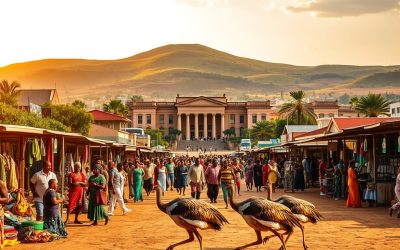Did you know that over 17% of Botswana’s land is dedicated to conservation? This makes it a unique destination for nature lovers. But before you pack your bags, understanding the local currency and payment options is essential for a smooth trip.
The official currency is the Botswana Pula (BWP). While some places accept US dollars, having local cash ensures you’re prepared for smaller payments and tips. Knowing the mid-market exchange rate is crucial, as it helps you avoid extra fees when converting money.
From travel debit cards to traditional cash, there are several ways to manage your spending. Comparing rates and fees from your card provider or a currency exchange service can save you money. Whether you’re planning an ATM withdrawal or using a credit card, being informed is the best way to make the most of your trip.
Introduction to Botswana Currency & Payments
Understanding local currency is key to a hassle-free journey. The official currency is the Botswana Pula (BWP), which comes in banknotes of 10, 20, 50, 100, and 200 pula, and coins of 5, 10, 25, and 50 thebe. While some places may accept US dollars, having BWP ensures you’re ready for smaller payments and tips.
Preparing your currency before travel saves time and money. Airport exchange rates often come with extra fees, and dynamic currency conversion can lead to poor rates. Instead, compare mid-market rates using reputable online tools like Wise or XE.
Using a travel debit card or a multi-currency account can help you lock in favorable rates. These options often have low foreign transaction fees, making them a cost-effective choice. Always check with your card provider for any additional charges.
“A well-prepared traveler is a happy traveler. Knowing your currency options ensures a smooth trip.”
Here’s a quick comparison of payment methods:
| Method | Pros | Cons |
|---|---|---|
| Cash (BWP) | Widely accepted, no transaction fees | Risk of loss or theft |
| Travel Debit Card | Low fees, secure, easy to manage | May have ATM withdrawal limits |
| Credit Card | Convenient, accepted in many places | High foreign transaction fees |
Carrying a mix of cash and cards is the best way to ensure flexibility. Inform your bank of your travel plans to avoid card blocks during transactions. With the right preparation, your trip will be as smooth as the Pula is strong.
Botswana: Ultimate Travelers Guide to Currencies & Payments
Planning your finances for a trip can make or break your experience. This guide covers everything you need to know about managing your money, from understanding live exchange rates to choosing the best payment methods.
One of the biggest challenges is navigating foreign transaction fees. These can add up quickly if you’re not careful. Using a travel debit card from a provider like Wise can help you avoid these extra costs. These cards often offer the mid-market exchange rate, which is the fairest option for currency conversion.
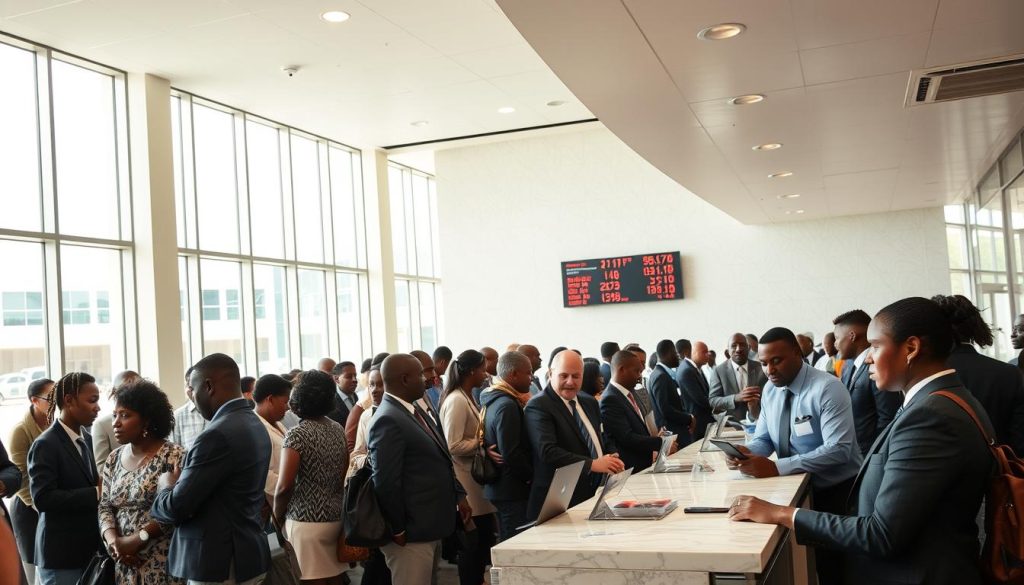
Another key aspect is managing ATM withdrawals. While ATMs are widely available, they may occasionally run out of cash, especially at the end of the month. Always carry some local currency, the Botswana Pula (BWP), for smaller payments and emergencies.
When it comes to payment methods, a mix of cash and cards is the best way to go. Credit cards are convenient but often come with high transaction fees. On the other hand, a wise account or a multi-currency card can save you money with low-cost options.
“Being prepared with the right currency and payment methods ensures a smooth and enjoyable trip.”
Understanding the exchange rate and markups applied by currency services is crucial. This knowledge helps you avoid unnecessary fees and get the most out of your spending. With the right preparation, you can focus on enjoying your journey without worrying about money.
Understanding Live Exchange Rates & Markups
Exchange rates play a big role in managing your travel budget. Whether you’re converting USD to BWP or AUD to BWP, knowing how rates work can save you money. The mid-market rate is the rate banks and major services use, but customers often face markups. Understanding these details ensures you get the best deal.
What is the Mid-Market Rate?
The mid-market rate is the average between the buy and sell prices of two currencies. It’s the fairest rate available, but most providers add a markup. This means you might pay more than the actual rate. Using a travel debit card from a provider like Wise can help you avoid these extra costs.
Tracking USD/BWP and AUD/BWP Rates
Exchange rates fluctuate constantly. For example, the USD/BWP rate might be different from the AUD/BWP rate. Monitoring these changes helps you plan your currency exchange at the right time. Reliable websites like XE or Wise offer live rate tracking, so you can compare and choose the best option.
Here’s a quick comparison of exchange rate sources:
| Source | Pros | Cons |
|---|---|---|
| Banks | Secure, widely available | High markups, slow processing |
| Currency Exchange Services | Convenient, fast | Hidden fees, poor rates |
| Online Providers (e.g., Wise) | Low cost, real-time rates | Requires advance setup |
By comparing rates and avoiding unnecessary markups, you can make the most of your travel money. Always check for hidden fees and choose a low-cost option for your currency needs.
Should You Exchange USD to BWP Before Travel?
Getting your currency sorted before your trip can save you time and money. Exchanging USD to BWP in advance ensures you’re prepared for your journey and helps you avoid unnecessary fees. Here’s why pre-travel currency exchange is a smart move.
Benefits of Pre-Travel Currency Exchange
Exchanging your money before departure often provides better exchange rates. Airport and hotel currency services typically charge higher fees and offer poor rates. By planning ahead, you can secure a low-cost option and avoid these markups.
Having local cash in BWP is also convenient for smaller purchases and tipping. Many places, especially in rural areas, may not accept cards. Carrying cash ensures you’re ready for any situation, from buying snacks to paying for transportation.
Another advantage is the time you save upon arrival. With BWP already in hand, you won’t need to search for an ATM or currency service. This lets you focus on enjoying your trip instead of worrying about money.
Before exchanging, compare rates from both online providers and local banks. Services like Wise often offer the mid-market rate, which is the fairest option. Taking this step ensures you get the most out of your travel money.
Tips for Exchanging Money in Botswana
Avoiding unnecessary fees starts with smart currency exchange practices. Knowing where and how to exchange your money can save you time and ensure you get the best rates. Here are some practical tips to help you manage your travel money effectively.
Steer Clear of Airport and Hotel Exchange Rates
Airport and hotel currency exchange services often charge high markups. These locations rely on convenience, but their rates are rarely favorable. Instead, plan ahead and exchange your money at trusted providers before your trip. This ensures you get a low-cost option and avoid extra fees.
Recognize Dynamic Currency Conversion Pitfalls
When paying with a card, you might be asked if you’d like to pay in your home currency instead of the Botswana Pula (BWP). This is called dynamic currency conversion, and it often leads to poor rates and hidden fees. Always choose to pay in the local currency to avoid unnecessary costs.
Using a travel debit card from a provider like Wise can help you bypass these issues. These cards often offer the mid-market exchange rate, which is the fairest option for currency conversion. They also minimize foreign transaction fees, making them a cost-effective choice for travelers.
“Smart currency exchange practices ensure you get the most out of your travel budget.”
Here’s a quick summary of tips to remember:
- Avoid airport and hotel exchange services due to high markups.
- Always choose to pay in Botswana Pula (BWP) to avoid dynamic currency conversion fees.
- Use a travel debit card from a trusted provider like Wise for low-cost transactions.
By following these tips, you can make the most of your travel money and enjoy a hassle-free trip. Planning ahead and choosing the right payment methods ensures you’re prepared for any situation.
Best Payment Methods in Botswana: Cash, Card, & More
Combining cash and cards is the best way to handle your travel budget efficiently. Each payment method has its advantages, and knowing when to use them can save you time and money.
Carrying some local cash, the Botswana Pula (BWP), is essential for small purchases and tipping. Many vendors, especially in rural areas, may not accept cards. Having cash ensures you’re prepared for any situation.
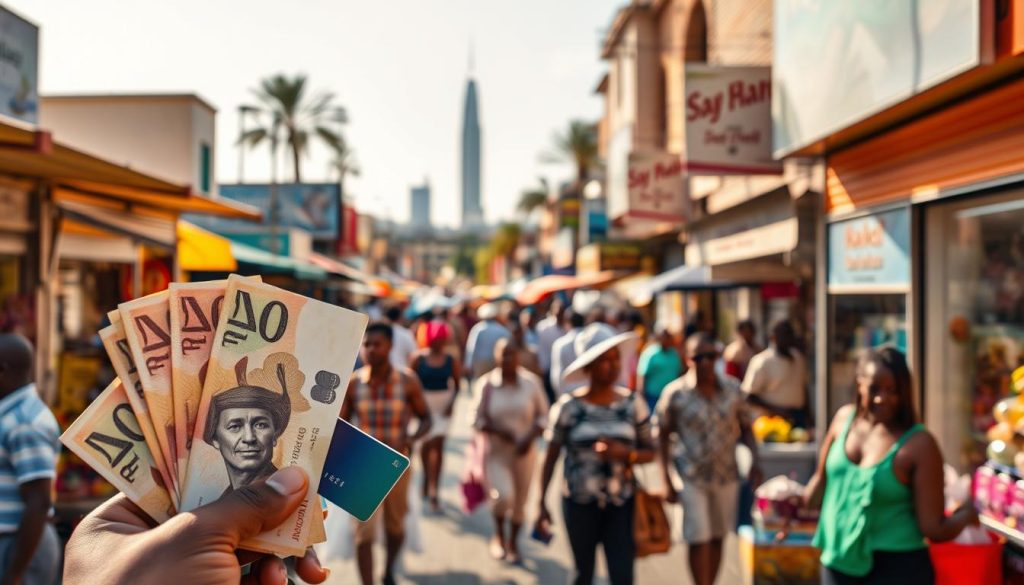
Using a travel debit card is another smart option. These cards often offer the mid-market exchange rate, which is the fairest rate for currency conversion. They also minimize foreign transaction fees, making them a low-cost choice for travelers.
Credit cards are convenient but can come with high transaction fees. If you choose to use one, always pay in the local currency to avoid dynamic currency conversion fees. This helps you get the most out of your travel money.
“Flexibility in payment methods ensures you’re ready for any situation while traveling.”
Here’s a quick comparison of payment options:
- Cash: Widely accepted, no fees, but risk of loss or theft.
- Travel Debit Card: Low fees, secure, and easy to manage.
- Credit Card: Convenient but often comes with high fees.
By combining these methods, you can enjoy flexibility and safety during your trip. Always inform your card provider of your travel plans to avoid unexpected blocks on your account.
Using Travel Debit Cards for Smooth Currency Conversions
Travel debit cards are a game-changer for hassle-free currency conversions. They eliminate the stress of carrying large amounts of cash and help you avoid hidden fees. One standout option is the Wise Multi-Currency Card, which offers a range of benefits for international travelers.
Wise Multi-Currency Card Benefits
The Wise Multi-Currency Card allows you to hold and manage over 40 currencies in one account. This flexibility ensures you’re always ready to spend in the local currency, whether you’re shopping, dining, or paying for transportation. The card uses the mid-market exchange rate, which is the fairest rate available, and charges low conversion fees.
Another advantage is the ability to make free ATM withdrawals up to a certain limit. This feature is especially useful when you need cash for smaller purchases or tipping. Plus, the card is widely accepted, making it a reliable option for your travels.
How to Set Up Your Account Easily
Setting up a Wise account is straightforward and can be done entirely through the app. Simply download the app, create an account, and order your card. Once your card arrives, you can start adding funds and converting currencies at the low cost mid-market rate.
The app also provides real-time notifications for every transaction, helping you track your spending. This transparency ensures you’re always in control of your travel money.
“With a travel debit card, you can focus on enjoying your trip instead of worrying about currency conversions.”
Here’s a quick comparison of the Wise Multi-Currency Card’s benefits:
| Feature | Benefit |
|---|---|
| Mid-Market Exchange Rate | Fair and transparent rates |
| Low Conversion Fees | Save money on every transaction |
| Free ATM Withdrawals | Access cash without extra fees |
| Multi-Currency Account | Hold and manage 40+ currencies |
Using a travel debit card like Wise ensures smooth transactions and reduces the stress of managing your travel money. It’s a smart choice for anyone looking to simplify their spending while exploring new destinations.
Comparing Debit, Prepaid, and Credit Cards for Your Trip
Choosing the right card for your trip can make a big difference in how you manage your money abroad. Each option—debit, prepaid, and credit cards—has its own set of advantages and drawbacks. Understanding these can help you decide which one suits your travel style and budget best.
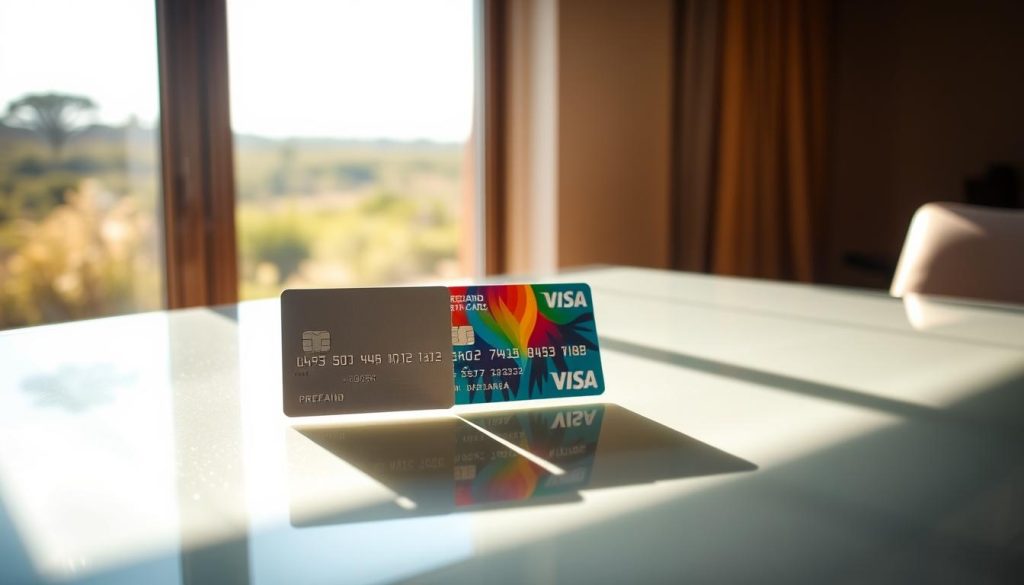
Debit Cards
Debit cards are a popular choice for travelers because they allow direct access to your bank account. They often come with low foreign transaction fees and are widely accepted. However, some banks may impose limits on ATM withdrawals, which can be inconvenient in areas where cash is essential.
Prepaid Cards
Prepaid cards, like the Wise Multi-Currency Card, offer flexibility by allowing you to load multiple currencies. They use the mid-market exchange rate, which is fair and transparent. These cards also minimize fees, making them a low-cost option. However, they may require advance setup and have limited acceptance in some regions.
Credit Cards
Credit cards are convenient and widely accepted, especially in tourist areas. They often come with travel perks like insurance and rewards. However, they can have high foreign transaction fees and cash advance charges. Always check with your card provider for specific terms before using them abroad.
Here’s a quick comparison of the three card types:
| Card Type | Pros | Cons |
|---|---|---|
| Debit Card | Low fees, direct access to funds | ATM withdrawal limits |
| Prepaid Card | Multi-currency support, low fees | Requires advance setup |
| Credit Card | Convenient, travel perks | High fees, cash advance charges |
By understanding the features and fees of each card type, you can choose the best way to manage your travel money. Whether you prefer the flexibility of a prepaid card or the convenience of a credit card, being informed ensures a smooth and cost-effective trip.
Managing Foreign Transaction Fees and Avoiding Hidden Costs
Traveling abroad often comes with unexpected costs, especially when it comes to foreign transaction fees. These fees are charged by banks or card providers when you use your card outside your home country. Typically, they range from 1% to 3% of each transaction, but can go higher in some cases.
For example, a $100 purchase could add an extra $3 or more to your bill. Over time, these fees can significantly increase your travel money expenses. Understanding how they work is the first step to avoiding them.
One of the best ways to minimize these fees is by using a travel debit card from a provider like Wise. These cards often offer the mid-market exchange rate, which is the fairest option for currency conversion. They also come with low or no foreign transaction fees, making them a cost-effective choice.
Here’s a quick comparison of traditional bank cards versus specialized travel cards:
- Traditional Bank Cards: High fees, limited transparency, and poor exchange rates.
- Travel Cards: Low fees, real-time exchange rates, and multi-currency support.
Always check the fee schedule with your card provider before using it abroad. Some cards may have hidden charges for ATM withdrawals or currency conversions. Being informed helps you avoid unnecessary costs.
“Using the right card can save you money and make your trip smoother.”
By choosing a low-cost option like a travel card, you can focus on enjoying your journey without worrying about extra fees. Planning ahead ensures you get the most out of your travel money.
Smart Strategies for ATM Withdrawals in Botswana
Withdrawing cash in the local currency can help you avoid unnecessary fees. Using ATMs in Botswana is a convenient way to access Botswana Pula (BWP), but knowing how to do it wisely ensures you get the best value for your money.
One of the best ways to save on fees is by withdrawing directly in BWP. This avoids dynamic currency conversion, which often comes with poor rates and extra charges. Always choose the local currency option when prompted at the ATM.
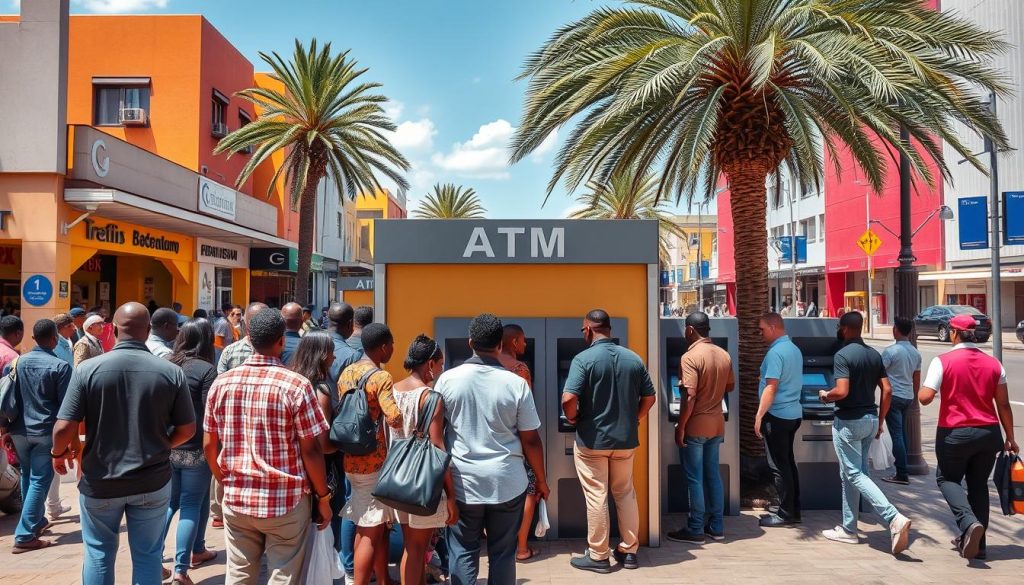
To minimize costs, avoid withdrawing large sums at once. Smaller, more frequent withdrawals can help you manage your travel money better and reduce the risk of carrying too much cash. It’s also a good idea to check with your card provider about any ATM-related fees before your trip.
If your bank card isn’t optimized for international use, consider a low-cost travel card. These cards often offer better exchange rates and lower fees, making them a smart choice for frequent travelers.
Finding ATMs in urban centers is usually easy, but it’s wise to plan ahead. Some ATMs may have withdrawal limits, so knowing these in advance helps you avoid surprises. Here’s a quick comparison of ATM usage tips:
| Tip | Benefit |
|---|---|
| Withdraw in BWP | Avoids dynamic currency conversion fees |
| Use smaller withdrawals | Reduces fees and security risks |
| Check with your card provider | Ensures you know all potential fees |
| Find ATMs in urban areas | Guarantees accessibility and reliability |
By following these strategies, you can make the most of your ATM withdrawals and enjoy a hassle-free trip. Planning ahead ensures you’re prepared for any situation while keeping your travel money safe and secure.
Planning Your Travel Budget in Botswana
Setting a travel budget ensures you make the most of your adventure without overspending. Knowing your daily expenses helps you stay on track and enjoy every moment without financial stress.
Daily Spending Estimates
On average, budget travelers spend around $27 (BWP 372) per day. This includes accommodation at budget hotels, meals at local restaurants, and public transportation. For mid-range travelers, daily costs rise to about $61 (BWP 841), covering nicer hotels and dining options. Luxury travelers can expect to spend $118 (BWP 1,626) daily, with high-end stays and fine dining.
- Accommodation: $13 (BWP 179) for budget hotels, $30 (BWP 414) for mid-range, and $54 (BWP 744) for luxury.
- Meals: $7 (BWP 95) at budget restaurants, $16 (BWP 221) at mid-range, and $35 (BWP 482) at luxury spots.
- Transport: Public buses cost around $1 (BWP 11) per ride, while taxis are pricier.
- Activities: Visiting attractions averages $34 (BWP 469) per day.
Setting Limits with Multiple Payment Options
Managing your travel money efficiently means balancing cash and cards. Carrying some local currency is essential for small purchases and tipping. Using a travel debit card can help you avoid high fees and lock in favorable exchange rates.
Here’s how to set your budget:
- Estimate your daily spending based on your travel style.
- Allocate funds for accommodation, meals, transport, and activities.
- Keep a small buffer for unexpected expenses.
“A well-planned budget ensures you can focus on enjoying your trip without worrying about money.”
By combining cash and cards, you can stay flexible and secure. Always inform your card provider of your travel plans to avoid unexpected blocks. With the right preparation, you’ll have a stress-free and memorable journey.
Navigating Currency Exchange Providers and Local Rates
Finding the best way to exchange your money can save you time and avoid unnecessary fees. Whether you choose online platforms or local providers, understanding the differences ensures you get the most value for your travel money.
Evaluating Online vs. Local Providers
Online services like Wise offer low cost and transparent rates. They use the mid-market exchange rate, which is the fairest option for currency conversion. This means you avoid the markups often applied by local providers.
Local exchange bureaus, on the other hand, may charge higher fees and offer less competitive rates. While they are convenient, especially in tourist areas, their lack of transparency can lead to unexpected costs. Always compare rates before committing to a provider.
Here’s a quick comparison of the two options:
- Online Providers: Transparent rates, low fees, and real-time tracking.
- Local Providers: Convenient but often come with hidden fees and poor rates.
Tips for Choosing the Right Provider
When selecting a provider, consider their reliability and licensing. Online platforms like Wise are regulated and offer secure transactions. For local providers, check reviews and ensure they are authorized by local authorities.
Another factor is accessibility. Online platforms allow you to manage your currency exchange from anywhere, while local providers may require in-person visits. If you’re traveling to remote areas, having a mix of cash and a travel debit card ensures you’re prepared for any situation.
“Choosing the right provider ensures you get the best rate and avoid unnecessary fees.”
By evaluating your options and planning ahead, you can make the most of your travel money. Whether you prefer the convenience of online platforms or the immediacy of local providers, being informed is the key to a smooth trip.
Conclusion
Smart financial planning ensures a stress-free travel experience. Knowing your payment options and exchange rates can save you time and money. Always aim to obtain local currency in advance to avoid high fees at airports or hotels.
Using a travel debit card is a great way to minimize transaction fees and lock in favorable rates. Researching providers and comparing rates before your trip helps you get the best value for your spending.
By combining cash and cards, you can stay flexible and secure during your journey. Plan ahead, choose the right payment methods, and enjoy a smooth trip without financial stress.
The above is subject to change.
Check back often to TRAVEL.COM for the latest travel tips and deals.
Here are some Tours & Sightseeing suggestions that might pique your interests!


